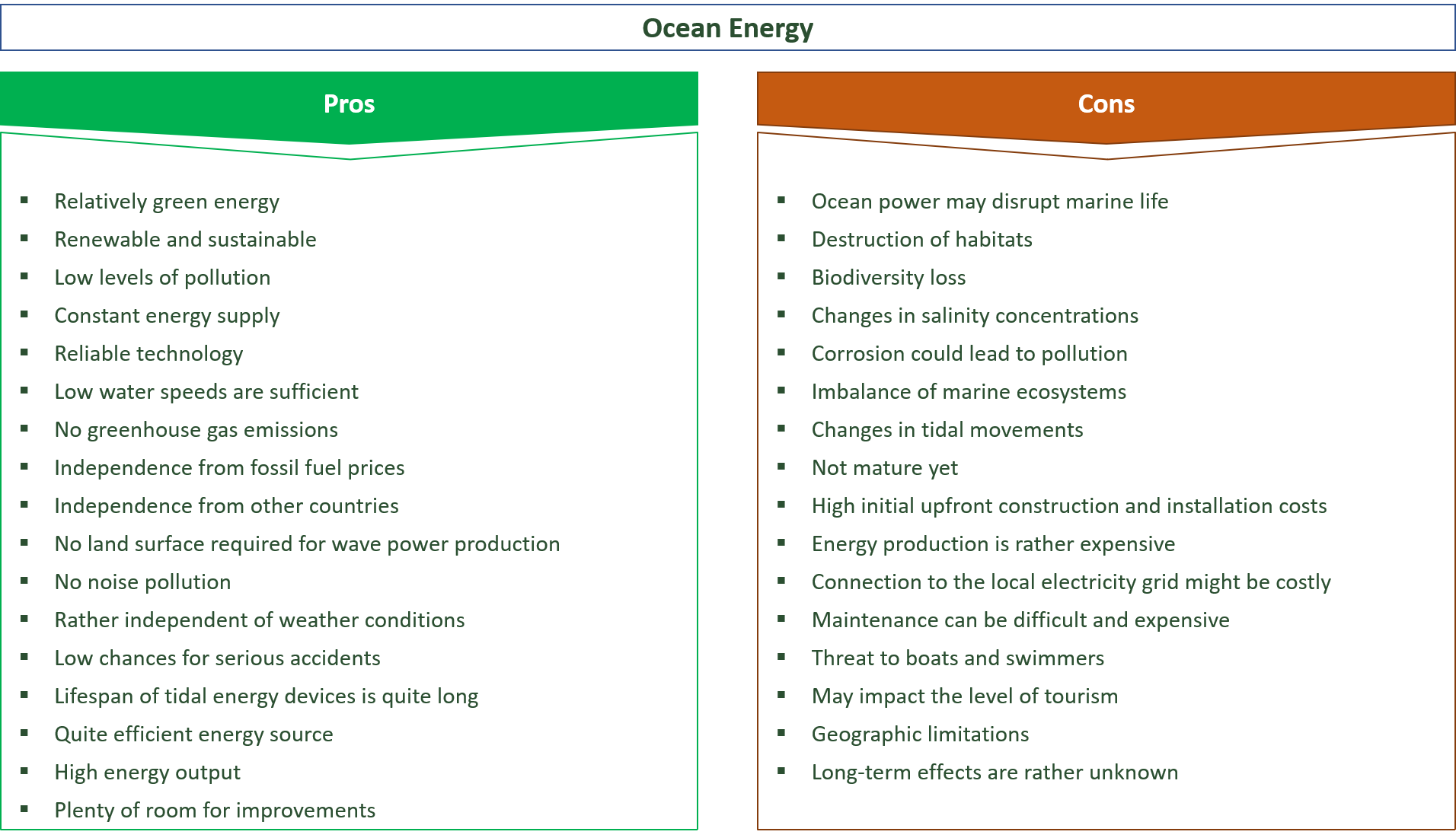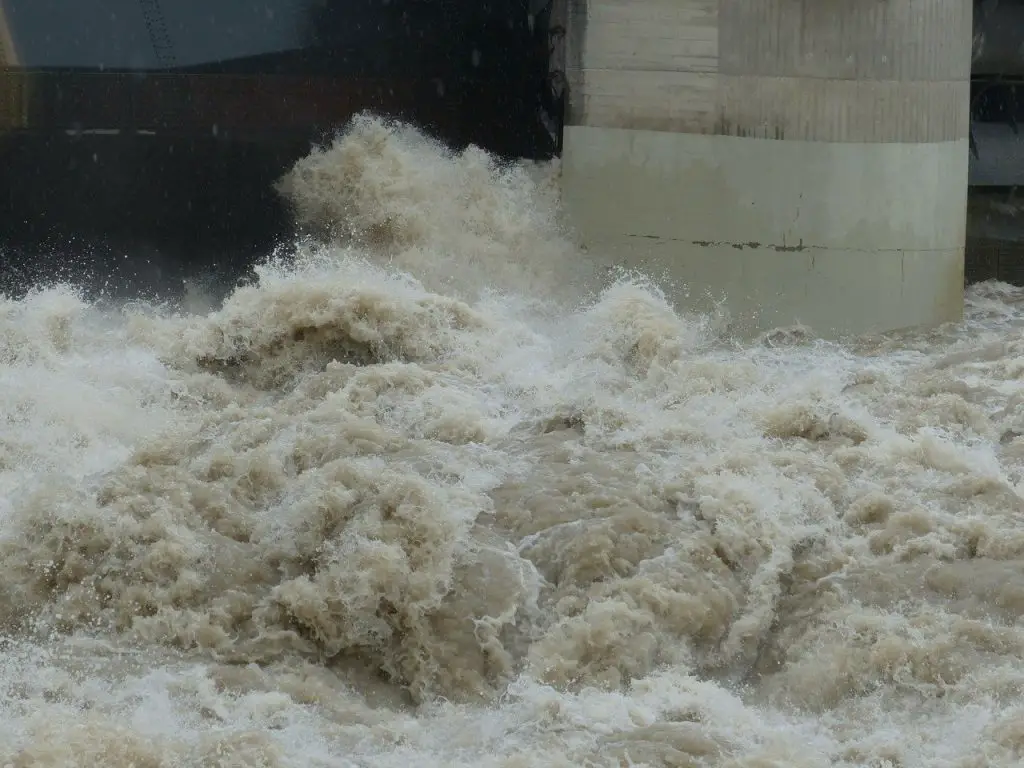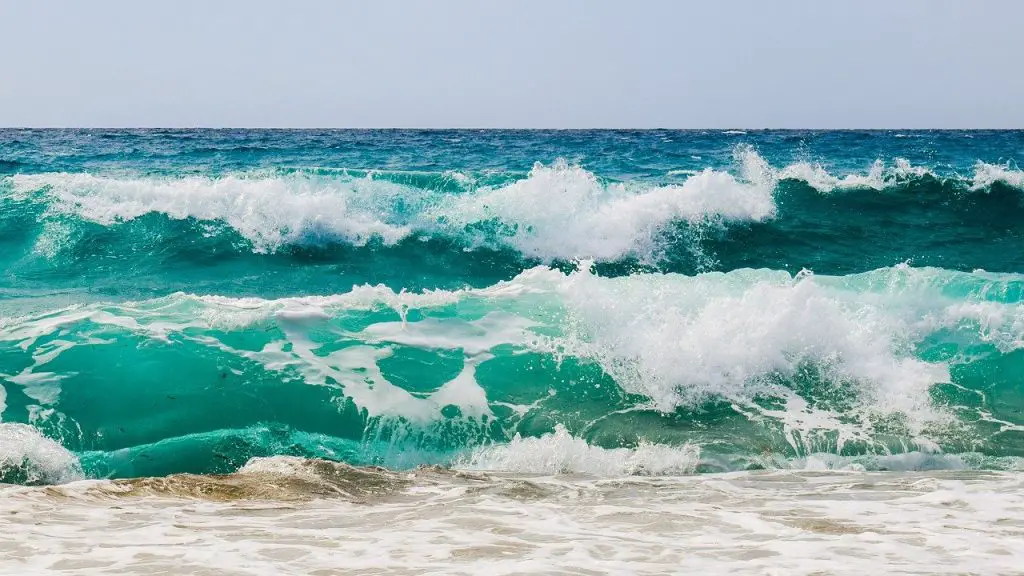“Everything goes in waves. Evolution goes in waves. The ocean goes in waves. Energy goes in waves. Sound travels in waves.”
Edgar Ramirez, Actor
Advantages & Disadvantages of Tidal & Wave Energy

Tidal energy and wave energy, which are both parts of ocean energy, can be regarded as energy that is produced by using the natural movements of ocean water.
Even though this technology has huge potential, it is rather unknown to the general public.
Ocean energy has many advantages, however, it also implies serious downsides.
In this article, the pros and cons of ocean tidal wave energy are examined.
Audio Lesson
Contents
Advantages of Tidal Energy and Wave Power
- Relatively green energy
- Renewable and sustainable
- Constant energy supply
- Reliable technology
- Low water speeds are sufficient
- No greenhouse gas emissions
- No significant pollution
- Independence from fossil fuel prices
- Independence from other countries
- No land surface required for wave power production
- No noise pollution
- Rather independent of weather conditions
- Low chances for serious accidents
- Lifespan of tidal energy devices is quite long
- Quite efficient energy source
- High energy output
- Plenty of room for improvements
Relatively green energy
Ocean energy can be regarded as a rather green energy.
Contrary to conventional fossil fuels, it does not imply significant air pollution.
Moreover, there are also no long transportation distances in the production chain of wave or tidal energy involved, which makes this technology greener compared to energy production with fossil fuels like coal.
Thus, ocean energy can be seen as a pretty eco-friendly power source.
Renewable and sustainable
Wave energy is also a quite sustainable and renewable power source.
Since our ocean existed long before the first human populated the planet and will remain once humanity becomes extinct, ocean energy can be regarded as one of the most sustainable energies.
We as humanity will never run out of ocean water, which makes this technology more renewable than most other alternative energy sources.
Constant energy supply
Since water movements are pretty predictable over the course of a year, a constant energy supply with ocean energy might be possible.
This implies that in periods of the year where there are bigger water movements, excessive energy is stored which can be used in lower water movement periods when less energy can be produced.
Thus, swings in energy supply from wave energy could be balanced by storing energy, which may result in a pretty steady supply energy supply from ocean power.
Reliable technology
Since the mechanisms behind wave and tidal energy are rather simple to understand, ocean energy can be regarded as a quite reliable technology that could produce large amounts of money, at least in areas where there is sufficient coastal access.
Compared to other alternative energies like wind or solar power, ocean energy also does not rely too much on outside conditions, which makes it more reliable compared to those other energy sources.
Low water speeds are sufficient
Since water has a 1000 times higher density compared to air, water movements imply enormous power.
Thus, even only low water speeds are sufficient to produce significant energy, meaning that wave energy can also be used in rather quiet ocean regions and does not need huge waves to work properly.
No greenhouse gas emissions
Another big advantage of ocean energy is that it does not emit harmful greenhouse gases into our atmosphere.
This is pretty important in the context of global warming.
Since the emission of greenhouse gases significantly contributes to the global warming issue, we need a switch from conventional energy sources like fossil fuels to alternative energies in order to reduce our greenhouse gas emissions and to slow down global warming.
No significant pollution
Ocean energy does not imply the emission of harmful greenhouse gases, nor does it imply any other form of pollution.
Thus, compared to other conventional fuels, it can be regarded to be much more eco-friendly.
Since pollution of many sorts leads to severe environmental issues, the absence of pollution from tidal or wave energy can also be regarded as a big plus of ocean energy.
Independence from fossil fuel prices
Since fossil fuels are finite resources, chances are that the world market prices for fossil fuels will increase significantly over the next decades.
This may pose big problems for countries that continue to rely on fossil fuels as primary energy source.
Hence, it may be a good idea to switch from conventional fossil fuels to alternative energies like ocean power in order to become independent of price movements of fossil fuels.
Independence from other countries
Another upside of ocean energy is that it can lower the dependence on foreign countries regarding the supply with fossil fuels.
Economic dependence often also implies political dependence.
Thus, by switching from conventional to alternative energies like tidal or wave energy, the level of dependence could be significantly lowered and political freedom might increase.
No land surface required for wave power production
For the production of ocean power, there is no need to use areas of land surface at all.
This is quite unique since most other energy sources require the use of large areas of land in order to build power plants and the related infrastructure.
By using ocean energy, land habitats of animals and plants could be protected and the land could also be used for other purposes like agriculture or reforestation.
No noise pollution
Since the production of tidal energy is often done in quite remote areas of our oceans, it might not lead to any sort of noise pollution at all.
Thus, compared to other energy sources like wind energy, this may be another important advantage of ocean power.
Rather independent of weather conditions
Contrary to other alternative energies like solar or wind power, ocean energy is quite independent of outside weather conditions.
For instance, for the production of tidal or wave energy, it doesn’t matter if there is sunshine or rain.
This makes this energy source quite reliable and steady energy supply can be assured.
Low chances for serious accidents
Compared to other energy sources, the risk of severe accidents is quite low when it comes to the use of ocean energy.
For instance, if a nuclear power plant gets into trouble, large areas of land can be contaminated with radioactive material and thousands of people may die from the long-term consequences.
Contrary to that, since wave and tidal energy solely work with the power of water, there are not such catastrophic events possible.
Lifespan of tidal energy devices is quite long
Tidal energy plants commonly have a longer lifespan compared to other energy devices like wind turbines or nuclear power plants.
Thus, once installed, ocean power plants can produce large amounts of energy over a quite long period of time.
Quite efficient energy source
Wave energy can also be regarded to be a quite efficient energy source compared to other alternative energies.
By using tidal or wave energy, most of the energy that is contained in our ocean waters can be used for energy production purposes and only small fractions of energy are lost in these processes.
High energy output
With the help of ocean energy, large amounts of green power can be produced. In fact, whole cities could be supplied by a single big ocean energy plant.
Hence, this kind of technology would be quite promising as supplementary power source in order to accomplish the transition process from fossil to renewable energy sources in a short period of time.
Plenty of room for improvements
Since ocean energy is still not mature yet, there is plenty of room for improvements, which may lead to serious increases in efficiency and could lower the costs associated with tidal or wave power production.
Thus, especially in the future, ocean energy may become an even more popular energy source.

Disadvantages of Wave Energy and Tidal Power
- Ocean power may disrupt marine life
- Destruction of habitats
- Biodiversity loss
- Changes in salinity concentrations
- Corrosion could lead to pollution
- Imbalance of marine ecosystems
- Changes in tidal movements
- Not mature yet
- High initial upfront construction and installation costs
- Energy production is rather expensive
- Connection to the local electricity grid might be costly
- Maintenance can be difficult and expensive
- Threat to boats and swimmers
- May impact the level of tourism
- Geographic limitations
- Long-term effects are rather unknown
Ocean power may disrupt marine life
One downside of ocean power is that it may disrupt marine life.
Due to changes in water movements, fishes and other sea animals may have to move since their natural living conditions have been altered.
Destruction of habitats
For the construction of wave or tidal energy plants, local marine habitats may be destroyed.
This may lead fishes and other sea animals to leave those areas. Plants that cannot simply leave may die off or significantly decrease in population.
Biodiversity loss
Especially in areas close to ocean power plants, the local marine life will suffer significantly from changes in their natural living conditions.
This may in turn lead to a state where the reproduction rate of water animals may become much lower, which may lead to a local endangerment or even extinction of species, which in turn may imply a serious loss of biodiversity.
Changes in salinity concentrations
Due to changes in ocean water movements and the use of large amounts of water for power production purposes, the salinity concentration in areas with a high concentration of ocean power plants may decrease significantly, which may hurt many sea animals and plants which are usually quite sensitive to changes in their natural living conditions.
Corrosion could lead to pollution
Even though ocean energy devices are usually made out of robust materials, over a long period of time, even those materials may suffer from corrosion.
Corrosion can lead to serious leaks, which may in turn lead to significant water pollution.
In turn, many fishes and other water animals living in nearby areas may die off or move to other locations.
Imbalance of marine ecosystems
The construction and operation of a high concentration of ocean power plants can also lead to an ecological imbalance of local ecosystems.
If water movements are altered and the local nutrient supply changes due to that, fishes and other water organisms have to leave to other locations or may even die off.
Since ecosystems are quite complex constructs, a decline in population of only some species may lead to serious effects on the whole ecosystem through chain reactions.
Changes in tidal movements
Tidal movements may also be altered due to the construction of tidal power plants.
This may lead to changes in water flows and may also lead to an altering of natural beaches.
Since the processes and dependencies regarding changes in tidal movements are quite complex, it may be impossible to estimate the effects correctly on an individual basis.
Not mature yet
Even though ocean energy might be a quite promising energy source in the future, it is far from mature yet.
Plenty of research and development has to be done in this area in order to make processes more efficient and also to avoid environmental problems related to it.
Thus, at the current point in time, it is not possible to generate sufficient energy from tidal or wave power plants to supply the general public.
Therefore, even though ocean energy could be used as a supplementary measure in the energy transition process, it cannot be considered to play a crucial role on a global scale.
High initial upfront construction and installation costs
Another disadvantage of ocean power is that there are rather large upfront construction and installation costs related to tidal and wave energy.
This may deter potential investors from investing their money in this kind of technology, especially since it is not mature yet.
Thus, investors may switch to investments in other alternative energies instead.
Energy production is rather expensive
The unit price for ocean energy is also quite high at our current point in time compared to other renewable energies like solar or wind power.
This may make it even more unattractive for companies to engage in this technology since they may not see enough potential for financial returns.
However, through technological advancements, wave and tidal energy may become much more efficient in the future, which may also lower the unit price for energy from ocean power plants.
Connection to the local electricity grid might be costly
Not only the construction costs related to ocean energy can be quite high, also the connection to the local electricity grid may be quite expensive.
This is especially true for ocean power plants that are located in quite remote parts.
In order to connect those plants with the local electricity grid, large sums of money have to be invested.
Maintenance can be difficult and expensive
In case of breakdowns, it may be quite time-consuming to repair ocean power plants due to bad weather conditions or other problems.
Especially for quite remote power plant locations, repairs and the overall maintenance may be quite costly and difficult.
Since the construction costs and the unit price of ocean energy are already quite high, the fact of costly repairs may make this kind of technology even less attractive to companies as well as to investors.
Threat to boats and swimmers
Ocean power plants may also pose a threat to swimmers or even to boats who are operating nearby those power plants.
Since boats may not know which areas they should circumnavigate, chances are that there may be accidents sooner or later.
Moreover, swimmers may also be in danger for accidents related to those ocean power plants since currents may be changed in an unexpected manner and swimmers may drown due to that.
May impact the level of tourism
In areas with a high density of ocean power plants, also the level of tourism may decline since people usually want to spend their vacation in nice clean areas with no visual pollution.
However, an abundance of wave or tidal energy plants may hurt the natural experience and tourists may switch to other locations in the future.
Geographic limitations
Since the production of ocean energy is only possible if companies or governments have access to coastal areas, there are significant geographic limitations to this kind of technology.
For instance, many countries do not have any coastal access at all. Those countries will not be able to produce ocean energy and have to rely on other alternative energy sources instead.
Long-term effects are rather unknown
Since ocean energy has not been explored over many decades and is also not mature yet, there might be severe environmental problems related to it which are currently not even known to humanity.
Hence, the overall environmental impact of wave and tidal energy has to be evaluated over the next years and decades in order to get a better impression of the true effects.

Top 10 Ocean Energy Pros & Cons – Summary List
| Tidal & Wave Energy Pros | Tidal & Wave Energy Cons |
|---|---|
| Green energy | Disruption of marine life |
| Sustainable & renewable | Habitat destruction |
| Low pollution levels | Loss of biodiversity |
| Constant energy supply | Changes in salinity concentrations |
| Reliable technology | Marine ecosystem imbalance |
| Works even with low water speeds | Altering of tidal movements |
| No greenhouse gas emissions | Technology is not mature yet |
| Independent from fossil fuel prices | High upfront costs |
| Independence from other countries | High unit energy price |
| No land surface required | Connection costs may be quite high |
Conclusion
Ocean energy might be a promising energy source, which may also be used for the energy transition process in conjunction with other green energies.
However, tidal and wave energy also have serious downsides.
There might be other alternative energies that may have more advantages and less problems compared to ocean energy.
Thus, it is questionable weather ocean energy could win the race against other promising alternative energies.
Sources
https://en.wikipedia.org/wiki/Marine_energy
https://ec.europa.eu/maritimeaffairs/policy/ocean_energy_en

About the author
My name is Andreas and my mission is to educate people of all ages about our environmental problems and how everyone can make a contribution to mitigate these issues.
As I went to university and got my Master’s degree in Economics, I did plenty of research in the field of Development Economics.
After finishing university, I traveled around the world. From this time on, I wanted to make a contribution to ensure a livable future for the next generations in every part of our beautiful planet.
Wanna make a contribution to save our environment? Share it!